March 4, 2014 •
Santa Clara County, California Passes Lobbyist Ordinance
The Board of Supervisors has adopted a Lobbyist Ordinance to regulate any person who contacts certain county officials with the purpose of promoting, supporting, modifying, opposing, or causing delay or abandonment of conduct. Ordinance No. NS-19-42 regulates contract lobbyists, in-house […]
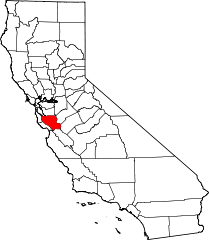
The Board of Supervisors has adopted a Lobbyist Ordinance to regulate any person who contacts certain county officials with the purpose of promoting, supporting, modifying, opposing, or causing delay or abandonment of conduct. Ordinance No. NS-19-42 regulates contract lobbyists, in-house lobbyists, lobbying firms, and expenditure filers who influence policy without directly contacting officials.
Legislative, procurement, and grassroots activity is covered by the ordinance, which specifically provides for the possibility a political action committee will qualify as an in-house lobbyist.
Registration and disclosure forms will be available when the ordinance becomes effective on March 27, 2014.
March 4, 2014 •
See Us in Person!
Here is our March – April calendar. State and Federal Communications will be attending these events. If you plan to be there as well, be sure to say hello! March 3-6 PAC National Conference, Miami Beach, Florida March 16-19 […]
 Here is our March – April calendar. State and Federal Communications will be attending these events. If you plan to be there as well, be sure to say hello!
Here is our March – April calendar. State and Federal Communications will be attending these events. If you plan to be there as well, be sure to say hello!
March 3-6 PAC National Conference, Miami Beach, Florida
March 16-19 NASPO Marketing to State Governments, San Diego, California
April 7-8 PAC Spring Executive Meeting, Washington, D.C.
April 9-11 SGAC Annual Meeting, San Francisco, California
April 30 – May 2 OSBA Convention, Columbus, OH
March 4, 2014 •
Our March Photo Scrapbook
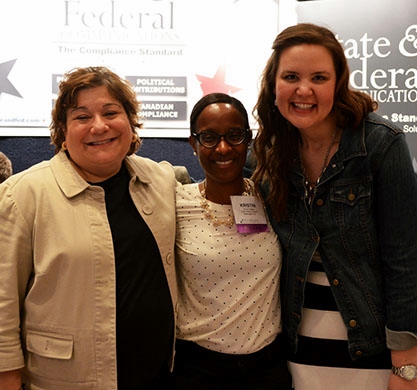
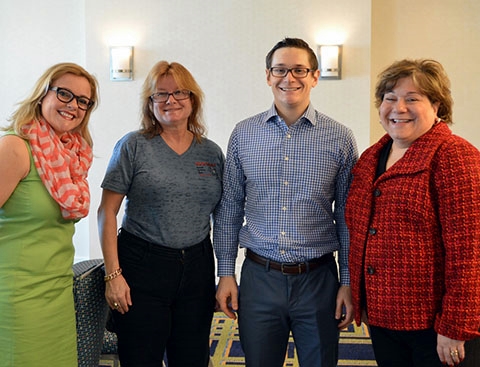
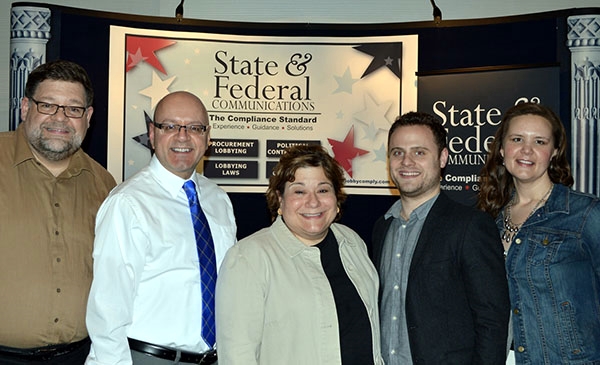

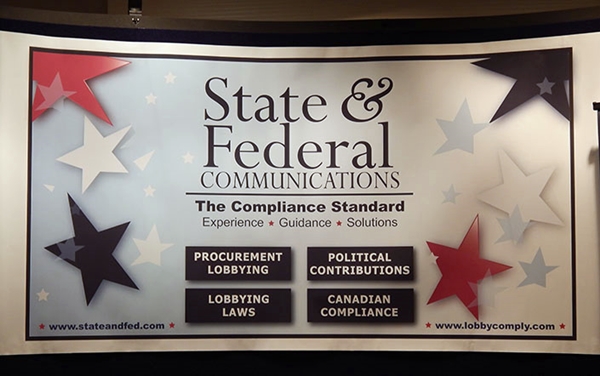
March 4, 2014 •
Call Us
For those of you who read this column regularly, you know I like my music. Call me (call me) on the line Call me, call me any, any anytime Call me (call me) I’ll arrive You can call me […]
For those of you who read this column regularly, you know I like my music.
Call me (call me) on the line
Call me, call me any, any anytime
Call me (call me) I’ll arrive
You can call me any day or night
Call me!
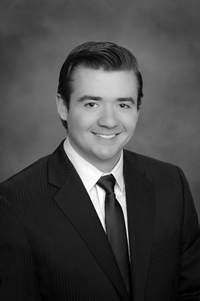 In this instance, we want you to call Elliott Postlewait, our marketing assistant. He is the #1 person who can help you navigate through our website. Our goal is to make sure all of our subscribers have everyone on staff understand the value received from State and Federal Communications. We are not just Compliance Now, Lobby Comply, Summary of Changes, or News You Can Use. We do a lot more than just post on Facebook, Twitter, and YouTube.
In this instance, we want you to call Elliott Postlewait, our marketing assistant. He is the #1 person who can help you navigate through our website. Our goal is to make sure all of our subscribers have everyone on staff understand the value received from State and Federal Communications. We are not just Compliance Now, Lobby Comply, Summary of Changes, or News You Can Use. We do a lot more than just post on Facebook, Twitter, and YouTube.
Our website, www.stateandfed.com, is full of all of the information you need to handle compliance in your government relations or legal offices for lobbying, campaign finance, procurement, pay-to-play, and gift laws in the 50 states, District of Columbia, Federal, more than 250 municipalities, and Canada.
Give Elliott Postlewait a call at 330-761-9960 or e-mail him at epostlewait@stateandfed.com and set up a time for a call with your team. Call him, call him any anytime.
Until next month, take the time to take a drive through our website…Elliott will help you maneuver through our site.
Thank you,
Elizabeth Z. Bartz
President and CEO
@elizabethbartz
March 4, 2014 •
Super PAC Sues Over Pennsylvania Corporate Contribution Ban
A group billing itself as “the first nationwide super PAC focused on electing Democratic state legislators and other political leaders to build middle-class economic security” is challenging Pennsylvania’s ban on corporate and labor union contributions. General Majority PAC filed suit […]
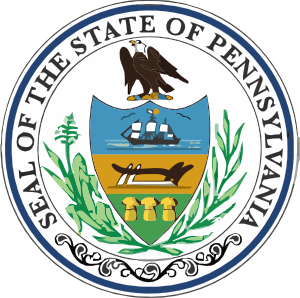
A group billing itself as “the first nationwide super PAC focused on electing Democratic state legislators and other political leaders to build middle-class economic security” is challenging Pennsylvania’s ban on corporate and labor union contributions. General Majority PAC filed suit in the U.S. District Court for the Middle District of Pennsylvania in late February, alleging the prohibition on PACs from receiving corporate and labor union contributions to make independent expenditures chills its free speech rights and is contrary to the U.S. Supreme Court’s Citizens United ruling.
Given the short amount of time until Pennsylvania’s primary election, the group also requested an injunction to immediately suspend the law so it may begin operating in Pennsylvania as soon as possible. General Majority made clear it intends to register as a Pennsylvania PAC upon reaching the state’s registration threshold, and will not coordinate with any state candidates or party committees.
Trenton Mayor Tony Mack was removed from office February 26 after a jury found him guilty of crimes of dishonesty. Mack is ineligible to hold public office in the future and lost his tax-payer funded pension. City Council President George […]

Trenton Mayor Tony Mack was removed from office February 26 after a jury found him guilty of crimes of dishonesty. Mack is ineligible to hold public office in the future and lost his tax-payer funded pension.
City Council President George Muschal was sworn in as acting mayor just hours after a judge ordered Mack’s removal. Although he is willing to serve out Mack’s term, Muschal made it clear he does not intend to run in the regularly scheduled mayoral election on May 13. He plans to spend the next few months working with the state, including Gov. Chris Christie, to facilitate positive change for the city.
After he took office in 2010, Mack’s administration clouded the city in a haze of corruption, cronyism, high crime rates, and financial mismanagement. Mack was convicted February 7 of six counts of bribery, fraud, and extortion; his sentencing is scheduled for May 14 in federal court.
The Ethics Commission will be holding a series of workshops over the next few months to receive input concerning proposed amendments to campaign laws. The suggested reforms include classifying the duplication of candidates’ campaign materials as nonmonetary contributions instead of […]
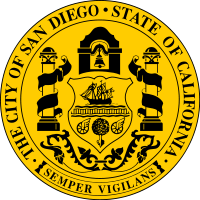
The Ethics Commission will be holding a series of workshops over the next few months to receive input concerning proposed amendments to campaign laws. The suggested reforms include classifying the duplication of candidates’ campaign materials as nonmonetary contributions instead of independent expenditures.
In addition, the commission seeks to curb the practice of making independent expenditures on credit so as to delay disclosure of donors who verbally agree to pay the debt after the election.
Commission staff researched and produced a report to be discussed at the next commission meeting on Thursday, March 13, 2014. The report is available here.
March 3, 2014 •
Ethics Reform in Virginia
Virginia’s lack of gift laws has been thrown into the spotlight recently with the federal indictment of former Gov. Bob McDonnell. McDonnell became embroiled in scandal after accepting gifts worth thousands of dollars from Star Scientific CEO Jonnie Williams. […]
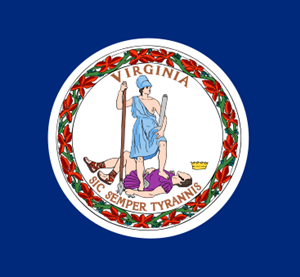
Virginia’s lack of gift laws has been thrown into the spotlight recently with the federal indictment of former Gov. Bob McDonnell. McDonnell became embroiled in scandal after accepting gifts worth thousands of dollars from Star Scientific CEO Jonnie Williams. While state law required all gifts of more than $50 to be disclosed, there was no limit on what a public official could accept from any donor. Williams also gave gifts to McDonnell’s wife and daughters; these gifts went undisclosed because state law does not require gifts to officials’ family members to be disclosed.
The national attention on Virginia has turned the tide in favor of ethics reform. Several ethics bills filed before the session convened on January 8 have now been incorporated into Senate Bill 649. This comprehensive bill prohibits gifts of more than $250 from lobbyists, requires reporting of gifts to immediate family members, changes lobbyist reporting from annual to semiannual, and establishes the Virginia Conflict of Interest and Ethics Advisory Council, a newly created legislative agency tasked with facilitating compliance with the state’s ethics laws. The bill passed the Senate on February 10 and the House of Delegates with a substitution and amendments on February 26, but the Senate rejected the House’s amended bill on February 28.
While it remains to be seen whether the General Assembly will pass ethics reform before it adjourns on March 8, newly sworn-in Gov. Terry McAuliffe took swift action to ensure his administration would not face the same ethical issues as McDonnell’s had. On his first day as governor, McAuliffe signed Executive Order 2, which prohibits the acceptance of gifts in the executive branch exceeding $100 per calendar year. The order became effective immediately upon his signature. Gifts from lobbyists and principals are now restricted to $25. The order does allow for some exceptions, such as excluding items of $25 or less from the definition of gift. It also allows the receipt of certain items while engaging in an activity serving a legitimate public purpose, such as food and refreshments served at certain events.
March 3, 2014 •
Ask the Experts – Local Level Lobbying
Q. My company is planning to get more engaged on the local level. What are some things I need to consider? A. There are many considerations for a company prior to engaging on the local level. To ensure you are […]
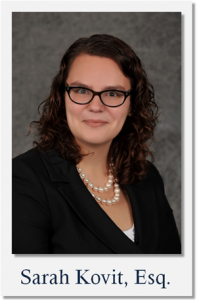
Q. My company is planning to get more engaged on the local level. What are some things I need to consider?
A. There are many considerations for a company prior to engaging on the local level. To ensure you are in compliance while interacting with municipal officials, it is important to check whether the municipality has a lobbyist registration ordinance, gift rules, or a pay-to-play ordinance. These provisions, if present, will impact your ability to engage with municipal officials. Requiring lobbyists to register on the municipal level is a quickly emerging trend throughout the U.S. This trend is not just impacting individuals who engage in what is generally regarded as lobbying, but also affecting permitting, sales, and other business functions.
For example, in San Jose, California, lobbying includes attempting to influence the proposal, drafting, development, adoption, recommendation, or approval of any contract, permit, license, or hiring action. The proliferation of these types of provisions has made it such that applying for a building permit, attempting to contract with the state, or even attempting to influence the selection of a candidate to be hired may be considered lobbying depending on the jurisdiction and the circumstances. The broad application of lobbying ordinances in municipalities merits attention and consideration prior to engaging to ensure registration is completed if needed.
An additional consideration is whether your company belongs to any trade associations with a lobbying presence in the municipality. Trade associations can help facilitate introductions to key players. However, you must still pay attention to the lobbyist registration threshold. It is a common misconception that being in the presence of a registered lobbyist negates an individual’s registration requirement. This is very rarely the case and should not be relied upon as a general rule. For more information about local level lobbying, please visit our website, www.stateandfed.com.
![]()
You can directly submit questions for this feature, and we will select those most appropriate and answer them here. Send your questions to: marketing@stateandfed.com.
(We are always available to answer questions from clients that are specific to your needs, and we encourage you to continue to call or e-mail us with questions about your particular company or organization. As always, we will confidentially and directly provide answers or information you need.) Our replies to your questions are not legal advice. Instead, these replies represent our analysis of laws, rules, and regulations.
February 28, 2014 •
Jane Feldman to Leave Colorado Independent Ethics Commission
Jane Feldman is stepping down as Executive Director of the Colorado Independent Ethics Commission. She is the first and only director to serve, as the commission is a product of a 2006 ethics ballot measure. Luis Toro, director of Colorado […]

Jane Feldman is stepping down as Executive Director of the Colorado Independent Ethics Commission. She is the first and only director to serve, as the commission is a product of a 2006 ethics ballot measure.
Luis Toro, director of Colorado Ethics Watch, praised Feldman, calling her “the very model of a dedicated civil servant.”
While Feldman looks forward to retirement from state government, her critics claim she may simply be a scapegoat. Complaints brought the commission under public scrutiny, and a House committee will soon hear a bill concerning the commission’s procedural mechanisms. Meanwhile, the commission is investigating Gov. John Hickenlooper for alleged gift violations.
There is no word yet of a new Executive Director.
February 28, 2014 •
Arkansas Lawmakers Delay Special Election for Lieutenant Governor
Lawmakers have passed a measure to keep the lieutenant governor’s office vacant until the November general election. Senate Bill 139 allows Gov. Mike Beebe to postpone a special election for the vacancy left by former Lt. Gov. Mark Darr, who […]
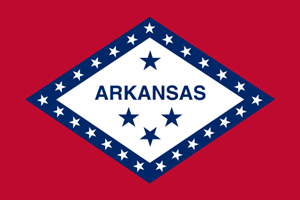
Lawmakers have passed a measure to keep the lieutenant governor’s office vacant until the November general election.
Senate Bill 139 allows Gov. Mike Beebe to postpone a special election for the vacancy left by former Lt. Gov. Mark Darr, who left office following $11,000 in fines for ethics violations.
The bill awaits Beebe’s signature.
February 28, 2014 •
Changes to Alaska Procurement Code Effective Today
SB12, signed into law September 2013, goes into effect today. The bill amends the state procurement code and makes changes to procurement preferences, contract awards, small purchase procedures and thresholds, minimum competition requirements, methods of bid submission, vendor registration requirements, […]

SB12, signed into law September 2013, goes into effect today. The bill amends the state procurement code and makes changes to procurement preferences, contract awards, small purchase procedures and thresholds, minimum competition requirements, methods of bid submission, vendor registration requirements, and applicable definitions.
Vendors may contact Chief Procurement Officer Jason Soza with any questions concerning the bill. Additionally, a summary of all changes can be found on the Department of General Services website.
February 28, 2014 •
News You Can Use Digest – February 28, 2014
National: In Some States, gaming Industry Consultants Double as Gambling Regulators Las Vegas Review-Journal – Hannah Dreier (Associated Press) | Published: 2/23/2014 As more cities and states embrace legalized gambling across the country, private companies are being […]

National:
In Some States, gaming Industry Consultants Double as Gambling Regulators
Las Vegas Review-Journal – Hannah Dreier (Associated Press) | Published: 2/23/2014
As more cities and states embrace legalized gambling across the country, private companies are being hired to write regulations and vet casinos, even as the same firms work the other side of the fence, helping casinos enter new markets and sometimes lobbying for their interests. Letting consulting companies with deep ties to the gambling industry decide how casinos are run is a significant departure from how established gambling states, including Nevada and New Jersey, do things.
Federal:
Where Have All the Lobbyists Gone?
The Nation – Lee Fang | Published: 2/19/2014
January records show spending on federal lobbyists decreased for the third consecutive year, and the number of registered lobbyists dropped to the lowest level since 2002. Despite word if its demise, some experts believe lobbying is not becoming extinct; it is only going underground. The combination of a loophole-ridden law, meager enforcement efforts, and a sophisticated strategy permitting third parties to develop faux-grassroots campaigns, as well as White House executive orders that dissuaded lobbyists from registering, all combined to collapse the system designed to track federal lobbying.
From the States and Municipalities:
California – California State Sen. Ron Calderon Indicted on Corruption Charges
Fresno Bee – Laurel Rosenhall (Sacramento Bee) | Published: 2/21/2014
California Sen. Ron Calderon was charged with accepting $100,000 in bribes, lavish trips, and no-show jobs for his children in exchange for pushing legislation to benefit a hospital engaged in billing fraud and participating in a film industry tax scheme that actually was an FBI sting. Calderon’s brother, Tom, a former state lawmaker-turned-lobbyist, was charged with money-laundering for funneling bribes through a tax-exempt group he controlled.
California – Lobbyist Kevin Sloat’s Penalty Falls Short, Ex-Employee’s Lawyer Says
Los Angeles Times – Patrick McGreevy and Paige St. John | Published: 2/20/2014
The California Fair Political Practices Commission signed off on a $133,500 fine for lobbyist Kevin Sloat, who made improper campaign contributions to elected officials. The attorney whose lawsuit triggered the investigation, criticized the commission for not addressing other allegations. The suit said Sloat and his firm arranged free golf games for lawmakers at a course run by a client, helped legislators get sports and concert tickets, and assisted one state Assembly member in buying art at a deep discount.
Connecticut – Federal Grand Jury Probes GOP Contracts
Connecticut Post – Ken Dixon and Neil Vigdor | Published: 2/21/2014
Lawmakers say they believe federal authorities are trying to determine whether any Connecticut House Republicans were pressured to use a particular company for their political campaign mailings. Federal subpoenas show the FBI wants to see contracts and correspondence between the House Republicans and two direct mail companies that have been used by the caucus members and the caucus’ PACs.
Georgia – Ethics: The ghost of Legislatures past
Georgia Public Broadcasting – Jeanne Bonner | Published: 2/20/2014
Georgia lawmakers attended a joint question and answer session to straighten out growing confusion about how to abide by the law that lobbyists’ spending on individual legislators to $75 per expenditure. Critics and supporters alike say it contains exceptions that may undermine the intent to rein in lobbyists’ power. The state ethics commission probably will not issue guidelines on complying with the law until this summer.
Hawaii – Lobbyists Would Have to Disclose More Details on Political Spending
Honolulu Civil Beat – Nathan Eagle | Published: 2/25/2014
Hawaii lawmakers are advancing legislation this session that would require lobbyists to account for the money they are spending by breaking it into categories that show how much goes toward food, entertainment, gifts, loans, and other areas. A separate bill aims to make lobbying disclosure reports available in a timelier manner, particularly after a special legislative session.
Minnesota – Bill Seeks to Undo Senjem’s Loosening of Gift Ban
Rochester Post-Bulletin – Heather Carlson | Published: 2/25/2014
During the last legislative sessionin Minnesota, a campaign finance bill was successfully amended to allow lawmakers and legislative employees to attend receptions thrown by lobbyists without having to pay for food and drinks. It does require that all 201 lawmakers be invited and given at least five days’ notice. Now, state Rep. Ryan Winkler has sponsored a bill to reinstate a ban on the practice.
Missouri – Ethics Bills Draw Little Praise from Missouri Lawmakers They Would Regulate
St. Louis Post-Dispatch – Virginia Young | Published: 2/26/2014
Members of the Missouri House General Laws Committee agreed the state needs to update its ethics laws, but were divided on how to do it and how far an overhaul should go. The committee considered several proposals, including ones that would require limits on campaign contributions and lobbyist gifts.
New Jersey – Bergen County Freeholders Tighten Limits on Political Donations by No-Bid Contractors
Bergen Record – John Ensslin | Published: 2/20/2014
Bergen County freeholders approved a “pay-to-play” bill that will drastically lower the amount of money contractors can donate to county political parties. The freeholders passed a resolution that will lower the allowed contribution from no-bid county contractors from $5,200 to $2,000. The move represents a reversal of a 2013 measure that softened restrictions during a critical election year for both parties and led to criticism from watchdog groups.
Oregon – Oregon Secretary of State’s Website is Back Up and Running
Salem Statesman Journal – Hannah Hoffman | Published: 2/24/2014
Oregon Secretary of State Kate Brown announced her department’s online systems – the Central Business Registry and ORESTAR, the state’s online campaign finance reporting system – are back up and running after being shut down for nearly three weeks following a security breach. Brown said a grace period has been established for political campaigns filing overdue reports, with fines for late transactions being waived.
Pennsylvania – Council Committee OKs Private Gifts of Up to $99 in Value to City Workers
Philadelphia Inquirer – Bob Warner | Published: 2/24/2014
A Philadelphia City Council committee gave initial approval to specific limits on the value of gifts that city workers can accept. The city’s five-decades-old gift law had never sets limits on the value of gifts that city workers, including elected officials, can receive. The ordinance would allow city employees to annually accept noncash gifts worth up to $99, even from people with official business before them.
Utah – Utah Legislature: Vote up or down – conflict or not
Salt Lake Tribune – Lee Davidson | Published: 2/24/2014
Utah and Oregon are the only two states where lawmakers cannot abstain and are required to vote even if they have a major conflict-of-interest on a bill. Utah Rep. Jim Nielson has introduced legislation to allow lawmakers to abstain or vote “present.” But he does not expect it to go far. In part, that is because leaders see conflicts as natural in a citizen Legislature, and they worry that creating more pressure to declare them and skip votes could get out of hand. Ethics reformers say a better system is needed.
Virginia – House Passes Ethics Bill with ‘Turkey Dinner Amendment’
The Daily Progress – Marcus Schmidt (Richmond Times Dispatch) | Published: 2/26/2014
The Virginia House passed a Senate ethics reform package. Senate Bill 649, which is almost identical to a proposal a House committee hammered out over several weeks, puts a $250 cap on gifts from lobbyists and anyone with business before the state, and it creates an ethics advisory council that will oversee and update Virginia’s financial disclosure system. Del. C. Todd Gilbert said he expects both bills to be dealt with in conference committee before one broad proposal heads to Gov. Terry McAuliffe.
Washington – State Legislators’ Financial Disclosures Fall Short
Seattle Times – Jim Brunner | Published: 2/22/2014
Although Washington frequently gets high marks from national open-government groups, some experts say one area where the state is lagging is in the personal financial disclosure by public officials. There are other flaws in the state’s disclosure system that leave holes in the public’s understanding of the financial affairs of their elected officials. As a result, some lawmakers file erroneous or confusing reports that go uncorrected unless spotted by political opponents, journalists, or activists.
 State and Federal Communications produces a weekly summary of national news, offering more than 80 articles per week focused on ethics, lobbying, and campaign finance.
State and Federal Communications produces a weekly summary of national news, offering more than 80 articles per week focused on ethics, lobbying, and campaign finance.
News You Can Use is a news service provided at no charge only to clients of our online Executive Source Guides, or ALERTS™ consulting clients.
February 27, 2014 •
Amended Ethics Bill Passes Virginia House of Delegates
Comprehensive ethics reform has advanced through the House of Delegates. Senate Bill 649 was passed by the House on February 26 with a committee substitute. The passed bill included an amendment prohibiting the governor and attorney general from accepting […]
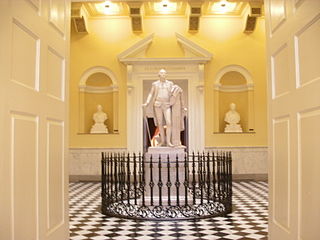 Comprehensive ethics reform has advanced through the House of Delegates. Senate Bill 649 was passed by the House on February 26 with a committee substitute.
Comprehensive ethics reform has advanced through the House of Delegates. Senate Bill 649 was passed by the House on February 26 with a committee substitute.
The passed bill included an amendment prohibiting the governor and attorney general from accepting tangible gifts from representatives of companies engaged in litigation with the state. The amendment stems from former Attorney General Ken Cuccinelli’s acceptance of Thanksgiving dinner from Star Scientific CEO Jonnie Williams, and is designed to prohibit such conduct.
The Senate bill and a similar House proposal will likely be worked into one broad ethics proposal in conference committee before heading to Governor Terry McAuliffe for his signature.
Photo of the Virginia Capitol Rotunda courtesy of Albert Herring on Wikimedia Commons.
State and Federal Communications, Inc. provides research and consulting services for government relations professionals on lobbying laws, procurement lobbying laws, political contribution laws in the United States and Canada. Learn more by visiting stateandfed.com.

